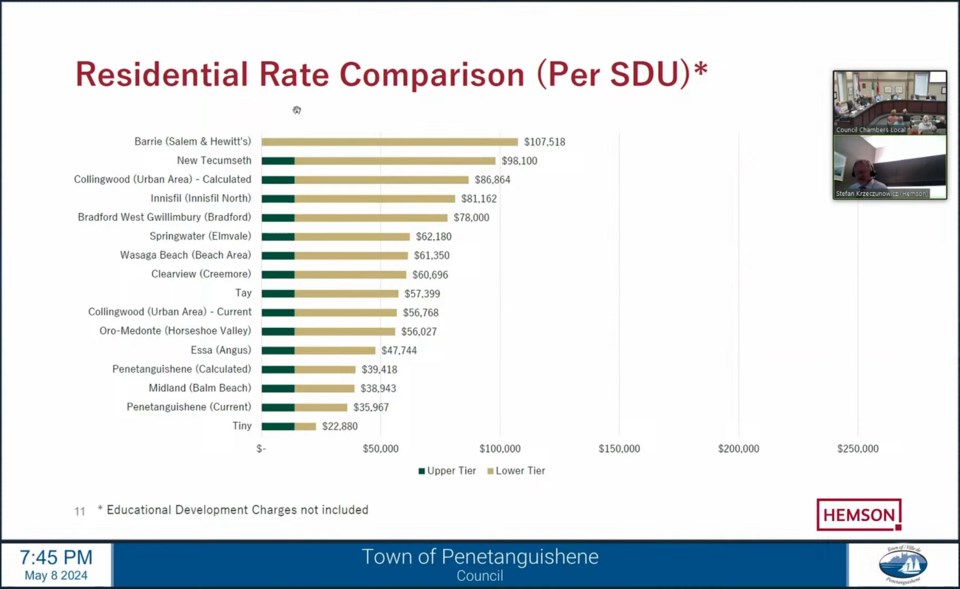In the pretzel of the current development charges landscape, Penetanguishene council and residents were treated to the untangled explanation of how it all makes sense.
An update on a 10-year development charge background study was provided to Penetanguishene council by Stefan Krzeczunowicz, associate partner with Hemson Consulting Ltd.
“Development charges are charges that are imposed on development to pay for growth-related capital costs – it’s capital costs only, not operating expenditures – and only to the extent that they are related to expanding or installing new infrastructure and facilities to meet the servicing needs of new development in Penetanguishene,” Krzeczunowicz explained.
He added: “The principle here is that growth should pay for itself so that the burden of paying for new infrastructure and new facilities is not borne by your existing taxpayers.”
As Penetanguishene’s current development charge bylaw is due to expire in September, the study aimed to address the town’s history of development charges, current and projected calculations, the breakdown of the amounts, and how those charges compare to other municipalities.
However, throwing a wrench into the works was recent legislation by the province through Bill 23, More Homes Built Faster Act in 2022, which introduced mandatory exemptions related to certain housing, and more recently the proposed Bill 185.
“A few weeks ago the government released a new Bill 185: Cutting Red Tape to Build More Homes Act, which reversed some of the Bill 23 changes and made some other changes as well,” said Krzeczunowicz. “The development charge exemption for affordable housing, which was introduced by Bill 23 but never brought into force, is now proposed to become effective on June 1 of this year.”
Forecasted development growth levels, according to Krzeczunowicz, are “around about 80 new housing units a year, and about 55 new jobs in the town per year over that (10-year) period, which is equivalent to about 2,000 square metres of new non-residential building space”
A chart showed council a summary breakdown of growth-related capital programs as divided by services. Krzeczunowicz noted that the gross costs of all projects over the approximate 10-year period amounted to roughly $182 million. “A significant component of those costs, about $166 million, is going to benefit your existing residents and cannot be included in the charge calculations.”
Following the numbers was a pie chart which showed a 43-percent slice allotted to parks and recreation, as per calculated draft residential charges.
“The maximum charge you could impose on a single or semi-detached unit is about $25,500; about $20,500 for a townhouse; and almost $17,000 for an apartment,” said Krzeczunowicz. “Currently the town imposes a charge of just over $22,000 for a single detached unit. The newly calculated charge is about $3,500 or 16 per cent higher. You can see that most of the increases can be found in the parks and recreation service and to a lesser extent the stormwater service.”
When asked to elaborate on the parks and recreation slice, Krzeczunowicz replied: “If you look at the gross cost of the parks and recreation capital program, you’ll see it’s about $47.5 million. About $45 million of that relates to a proposed multi-use recreation centre.
“It’s assumed right now that that MMRC facility would replace the current PMCC and possibly the curling club that exist right now,” Krzeczunowicz added. “Only the addition portion, the expansion portion of that facility has been included in the development charge. Nevertheless, that still represents a significant cost: $7.8 million.”
Krzeczunowicz also revealed comparison charts for residential and non-residential rates, per single and semi detached units. Penetanguishene’s current and calculated charges ranked at the bottom of both lists, with Tiny Township in last place and Midland also comparable to Penetanguishene.
“Most of the really high charges in Simcoe County can be found in the faster-growing southern portions of the county and in parts of Barrie; but even in the context of the northern municipalities Penetanguishene charges are quite low,” said Krzeczunowicz. “Note also that Midland’s charge needs to be updated by the end of the year too. If your experience is anything to go by, Midland’s charge will probably increase.
“The non-residential charge we’ve calculated is $143 per square metre (roughly 20 per cent or $24 increase) of new building floor space, and it’s almost all related to the water, sewer, stormwater and roads services,” said Krzeczunowicz.
In conclusion, Krzeczunowicz said that the consultants would prepare a development charge background study and draft bylaw for release in mid-June, followed by a public meeting. Their hope, he stated, was to have the bylaw passed by mid-August before the September deadline.
During the following committee of the whole meeting, Coun. Bonita Desroches pulled an item out of the council information package regarding a mid-April announcement of the Community Sport and Recreation Infrastructure Fund as part of this year’s budget.
“It’s pretty exciting,” Desroches stated. “There will be funding coming through the province for repairs or new facilities that are required in communities. The information will be released in the summer of 2024, so I’m anxiously awaiting to see the details about that.”
The 10-year development charge background study progress update from Hemson Consulting Ltd. can be located on the agenda page of the Town of Penetanguishene website.
Meetings of Penetanguishene council are held on the second Wednesday of each month, and can be watched live on Rogers TV cable 53 when available, or on the Rogers TV website.
Archives of council meetings are located on the Town of Penetanguishene YouTube channel.



